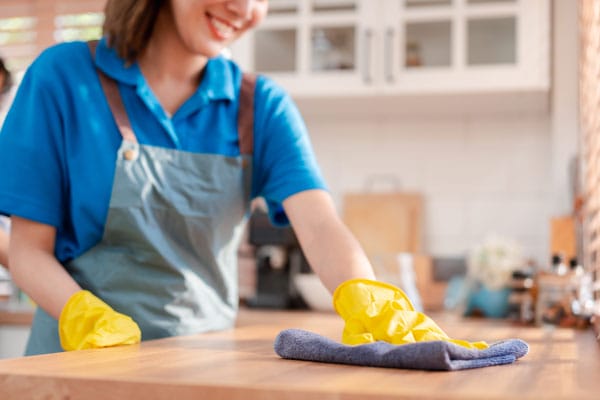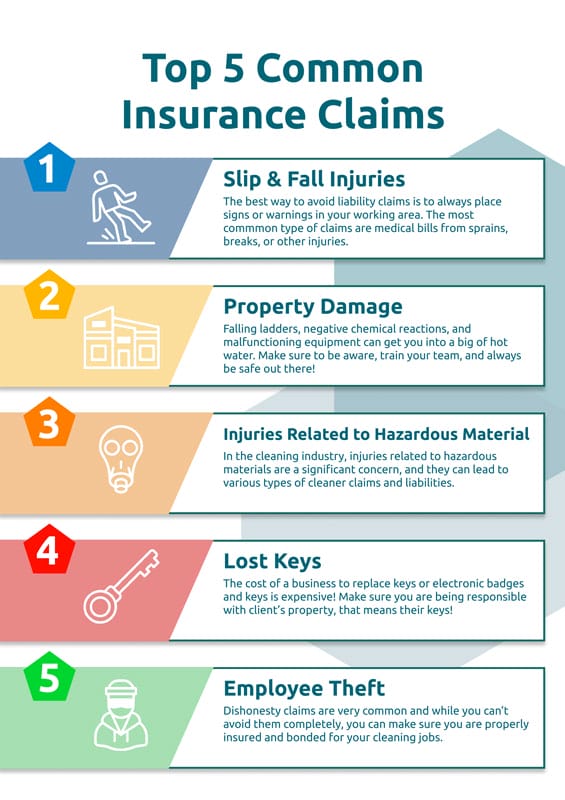Top 5 Most Common Cleaning Business Insurance Claims
The future of the cleaning industry is shining brighter than ever! With an impressive 11% annual growth rate, this booming sector proves that a commitment to exceptional service pays off.
But even the most meticulous industries can face unexpected bumps. Accidents happen, especially in the cleaning world. Let’s explore the most common cleaning insurance claims so you can keep your business spotless and thriving!
What Are the Most Common Insurance Claims for Cleaning Businesses?
Paying a premium for cleaning insurance can feel like just another expense—until a big claim hits. Of the wide-ranging claims seen in this industry, here are the five most common cleaner claims:
Click the image to view and download the full-size PDF.
1. Slip-and-Fall Injuries
Slips and falls are frequent in the cleaning industry. It’s not just those shiny, wet floors—tangled cords from vacuums and other equipment also come into play. These seemingly minor mishaps can lead to costly legal battles. The average slip-and-fall claim can cost tens of thousands due to medical expenses, lost wages, and legal fees.
Being proactive is your best defense. Train your team to handle equipment safely and spot hazards to prevent incidents. With the right precautions and insurance, you can protect your business from financial risks. Stay aware and prepared to keep your business on solid ground!
General liability insurance, which is the base coverage in cleaning business insurance, is designed to cover third party injury claims. So if a passerby ignores your “wet floor” sign, slips, falls, and ends up needing medical care, this coverage can protect you from having to pay out of pocket.
2. Property Damage
Stepping into a client’s space to work your cleaning magic is part of your job’s daily routine, but it also brings the risk of accidental damage.
Here are a few real examples of claims submitted by our insureds:
- A housekeeper reported a rogue piece of equipment hit a client’s wall, causing a hole
- A claimant used the wrong solution on a piece of furniture, damaging a pricey hutch
- A cleaning professional accidentally spilled the wrong solution down a client’s sink, causing damage to the pipes
- A janitorial business reported their equipment caused accidental damage to a venue’s floor
- While dusting, a maid accidentally knocked over a bottle of a client’s cologne, causing it to shatter
These scenarios aren’t rare—they’re part of the job and can quickly lead to claims against your business.
That’s where robust insurance becomes your safety net. It’s designed to cover these potential liabilities, ensuring that a simple mistake doesn’t become a financial disaster. With the right coverage, you can focus on delivering spotless results while knowing you’re protected.
3. Lost Keys
Got some regular clients who trust you with keys to their homes, offices, or storage spaces? That’s a big responsibility, and losing those keys can be a real wallet-buster, especially if you’re dealing with commercial properties.
Imagine misplacing a master key—yikes! Replacement costs could skyrocket with a claim—and land you with real business-pausing debt.
Here’s how to keep those keys safe and sound:
- Appoint a Key Guardian: Appoint a trusty supervisor to handle key distribution at the start of each shift and administer collection at the end. (FYI: If your team is tiny, that Key Guardian might be you! Get in the habit of placing keys in a secure location.)
- Buy a lockbox: Keep a set of master keys tucked away securely in a lockbox for each client.
Create a spreadsheet: Create a shared key log spreadsheet. If you house this information digitally, make sure you have encryption software and cyber liability insurance for extra security.
4. Employee Theft
Employee dishonesty is a major concern for cleaning professionals because your staff often works unsupervised in clients’ spaces. This can lead to theft, whether of your equipment or a client’s belongings, causing significant financial losses.
To protect your business, it’s important to review your liability options. Consider additional insurance or a janitorial bond for extra protection.
For the best coverage against theft, combine general liability insurance with a bond. At Insurance Canopy, you can buy a bond starting at $110/year.
5. Employee Injuries
Employee safety is paramount in the cleaning industry to avoid claims. Most compensation claims for cleaning workers arise from a lack of comprehensive safety protocols.
Here are a few common claims to consider when creating your team’s safety plan:
Specific cleaning agents
Heavy-duty cleaners are often necessary for tackling tough grime in bathrooms or kitchens. However, if not used properly, they can cause skin and eye corrosion. Ensure proper handling and protective gear.
Rickety ladders or step stools
Climbing up to dust those hard-to-reach spots or clean high windows? Make sure employees use sturdy ladders and step stools. A fall can lead to a workers’ comp claim.
Repetitive strain injuries
Tasks like vacuuming or mopping can lead to repetitive strain injuries. These injuries can affect the back, shoulders, and wrists. Encourage breaks, proper lifting techniques, and the use of lightweight equipment.
How Do I Avoid Cleaning Business Risks?
Reducing risks can minimize insurance claims. Here’s how:
Proper Training
- Train your team on safe chemical use, proper techniques, and the dangers of mixing products. This not only protects your employees, but also your clients’ property.
- Certify staff who handle specialized tasks like carpet cleaning and restoration. This ensures they know the ins and outs of the job, bringing all guesswork to a minimum and reducing the risk of errors and accidents.
- Provide your employees with the right protective gear, such as gloves and masks, and demonstrate how to wear them correctly. This helps prevent health issues and accidents, keeping everyone safe and sound.
Use the Right Equipment
- Equip your team with the right tools for each cleaning task. Using appropriate equipment reduces the chance of damaging client property and increases efficiency.
- Regularly check and maintain your tools to prevent malfunctions and accidents.
Maintain Safety Protocols
- Establish and enforce standard safety protocols that your employees can easily follow. Regularly review and update these practices to adapt to new challenges and ensure they remain relevant.
- Display clear instructions and reminders about safety measures in common areas.
- Don’t let employees work without proper safety gear — it’s not worth the risk to them or your company!
How To File a Cleaning Business Claim With Insurance Canopy
Filing a cleaning claim with Insurance Canopy couldn’t be easier! After you’ve secured a policy with us, you’ll receive access to an online dashboard that you can use to manage your policy and make claims. Here’s the fastest route to success:
- Log in to your dashboard
- Find “Manage Policies”
- Click on “File a Claim” and share your info
Once you’re done, a claims adjuster will get in touch to assist you. They’ll be with you every step of the way to ensure the claims process goes smoothly.
If you’re having trouble submitting a claim, our support team is here to help at any time.

Does Filing a Claim Impact My Insurance Premiums?
Filing a cleaning insurance claim can impact your premiums. Insurers may increase your premiums if you have multiple claims, seeing your business as a higher risk.
To keep premiums low, maintain a good claims history by managing risks well and only filing claims when it truly benefits your business.
Get Instantly Insured Online with Insurance Canopy!
Protecting your cleaning business with the right coverage is just a click away. Insurance Canopy provides a 100%-online experience, so you can get comprehensive coverage within minutes!
Don’t wait for an accident on this list to blindside you. Stay safe and shield your business with Insurance Canopy.

